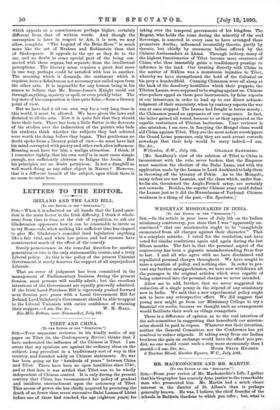TIBET AND CHINA.
[To Tn5 Enrron, or Tua " BracTATos."] SIB,—Your magazine reviewer, in his kindly notice of my paper on Tibet (in the Contemporary Review) thinks that I have underrated the influence of the Chinese in Tibet. I am aware that my opinions are against the ordinary ideas on the subject, long prevalent in a traditionary sort of way in this country, and founded solely on Chinese statements. No war has been going on for "hundreds of years" between China and Tibet. There have been no open hostilities since 1740; and at that date it was settled that Tibet was to be wholly independent of Chinese control It is only during the present century that China has recommenced her policy of gradual and insidious encroachment upon the autonomy of Tibet. This access of power she has chiefly acquired by procuring the death of no fewer than seven successive Dalai Lamas of Llminti, before one of these had reached the age (eighteen years) for taking over the temporal government of his kingdom. The Regent, who holds the reins during the minority of the real Sovereign, is asserted in every case to have arranged these premature deaths; influenced irresistibly thereto, partly by threats, but chiefly by enormous bribes offered by the Chinese Ambassadors at Lhisi. Through bribery, many of the highest functionaries of Tibet become mere creatures of China, who thus insensibly gains a traditionary prestige to influence in the land. Our treating directly with China in the matter of Sikkim was a monstrous injustice to Tibet, whereby we have strengthened the hold of the Celestial on his prey a hundredfold. Cunning Chinamen were all along at the back of the desultory hostilities which their puppets, the Tibetan Lamas, were supposed to be waging against us. Chinese wire-pullers egged on these poor instruments, by false reports- of our intentions, in order to lead up to our direct acknow- ledgment of their suzerainty, when by contrary reports the war- was at once stopped. The Lamas had fought in terror merely ; the Chinamen posed as appeasers of our vengeance. In fact, the latter gained all round, because to us they appeared as the- capable restrainers of Tibetan barbarism. Your reviewer is also mistaken, I am sure, in fancying the Mongol clans would' aid China against Tibet. They are the most ardent worshippers- the Grand Lama possesses, only they are such arrant cowards nowadays that their help would be sorry indeed.—I am, Sir, Ste., [Mr. Sandberg's view of the relation of Tibet to China is inconsistent with the rule, never broken, that the Emperor must sanction the election of the Dalai Lama, and with the- application made by the Lamas to Lord Auckland to help them in throwing off the tyranny of Pekin. As to the Mongol",. many tribes are not Lamaist, and the clans which, under San- ko-lin-sin, threatened the Anglo-French army, are certainly not cowards. Besides, the regular Chinese army could defeat the Lamas just as it did the Mussulmans of Yarkand. Chinese weakness is a thing of the past.—En. Spectator.]


































 Previous page
Previous page